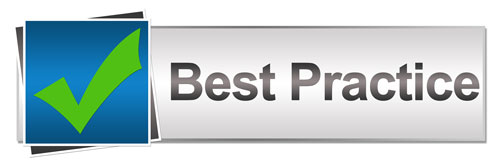
The results of a brainstorming session where the attendees came up with 65 customer service best practices.
1) How can we make it easier for our customers to do business with us?
2) Online message board to better communicate calls that are received
3) Questions and answers online – online help
4) Instant chat lines set up to answer customers concerns
5) Increase one stop shopping – get call answered
6) Technical staff should get out and meet customers
7) Have a profile and complete record of each customer.
8) Checklist for people who are at help desk for answers to frequently asked questions and for what questions to ask the customers
9) Customer rep for each floor
10) Focus groups/Brainstorming sessions with customers
11) Very clear instructions for customers. (i.e. little card for instructions)
12) Effective service level agreements
13) Call back after assistance to see if problem was solved
14) Pleasing personality – work on SOFTEN and phone personality
15) Have 800 telephone numbers
16) Support off hours and weekends 24/7
17) Onsite support for each floor and field office
18) Develop a pamphlet and online directions on how things work – step by step
19) Be accessible to customers
20) How do we meet and exceed expectations?
21) Good timely response
22) Have meeting with staff to outline and discuss what excellent customer service means. (Can’t just say quality, but explain what exactly quality means)
23) Go beyond solving to explaining and educating the customer
24) Acknowledge customers – give full attention and listen
25) Contact after the problem has been solved – follow up
26) Customer advisory board
27) Anticipate problems and solve them before the customer complains
28) Underpromise and overdeliver
29) Do what you say you are going to do
30) Do it when you say you are going to do it
31) Do it right the first time
32) Train and educate customer base on what we can and can’t do
33) Think outside of the box
34) Customer surveys/focus groups
35) Reward exceptional performance for meeting and exceeding expectations
36) Determine customer expectations
37) Set guidelines for being more reliable, responsive and credible
38) How do we overcome an attitude of indifference on our part towards the customer?
39) Listen to them
40) Follow up
41) Empower customers – Give them the tools to do things themselves
42) Get more customer involvement
43) More educational opportunities for the staff
44) Prompt assistance
45) Ask the right questions to find real problems and concerns
46) Customer focus groups
47) If cannot resolve customers problem direct it to the right place
48) One stop shop – one person should know answers or manage the response to make sure customer gets an answer and is not “tossed around”
49) Be sincere and genuine – not just insincere “smiles”
50) Don’t add burden to customers frustration
51) Don’t take it personally
52) Incentives for the staff
53) Customer relations training for everyone at all levels
54) Make everyone feel like part of the organization – connecting to the core mission
55) Don’t think of customers as being a nuisance. If you do you will inadvertently treat them that way
56) How do we make the workplace a more positive place to work?
57) Improve managers knowledge about the real work environment
58) Empowerment for employees to make decisions
59) Rewards and strokes – appreciation
60) Teambuilding sessions with the whole team
61) Open communication
62) Clear guidelines
63) Say “NO” less often
64) More recognition for both internal and external customers
65) Showing the flag – get in front of the customer more often – visit
About the Author
Arnold Sanow, MBA, CSP works with companies and organizations to build stronger customer and workplace relationships by improving verbal, interpersonal and organizational communication.





This was very helpful.
Very Heplful